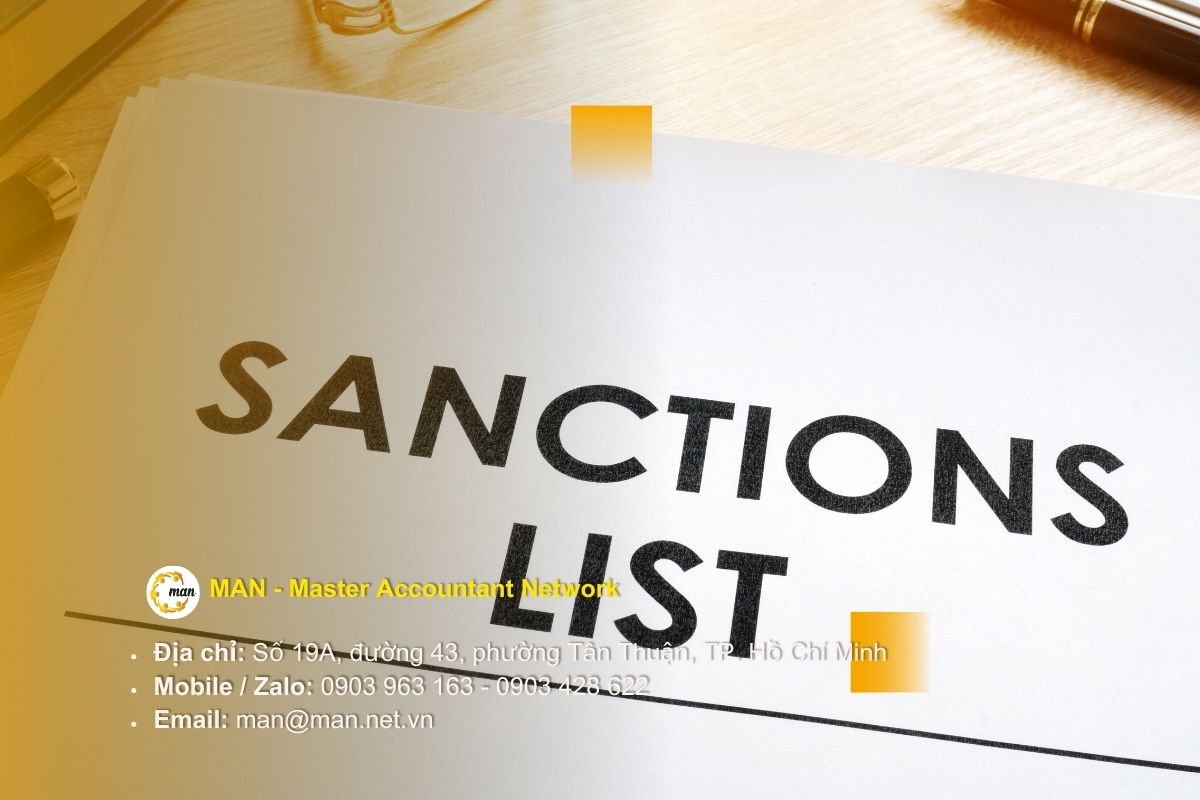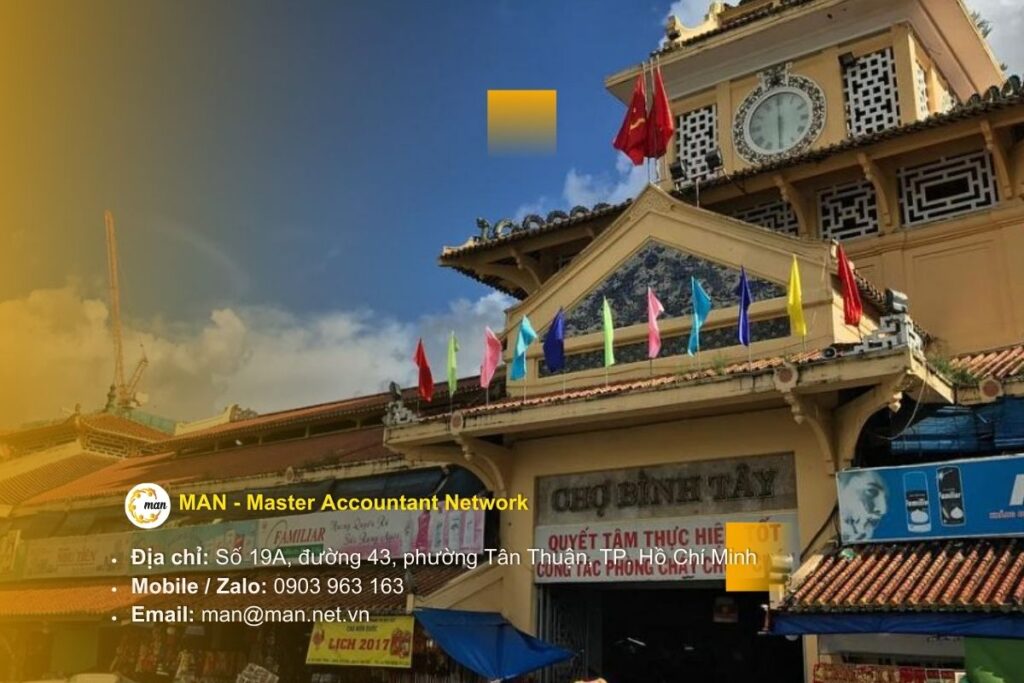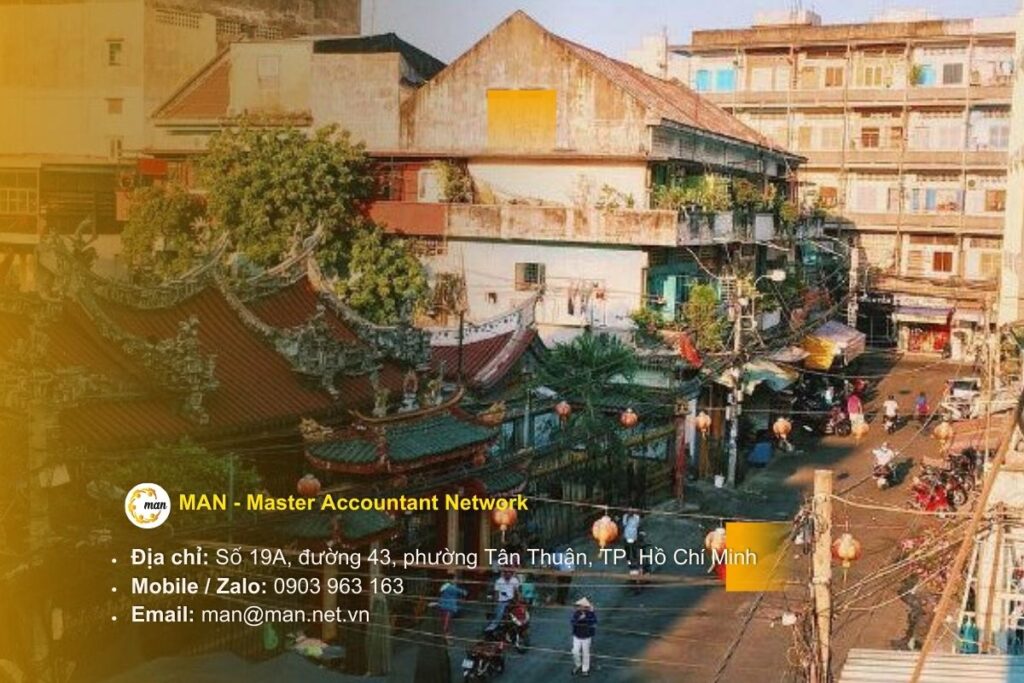Create a profile affiliate transactions (GDLK) is not only a legal obligation but also an important strategy to help businesses protect their reputation, financial transparency and maintain stable development. According to Decree No. 132/2020/ND-CP According to the Government's regulations, enterprises are obliged to declare information on related relationships and related transactions when transactions arise with related parties.
Preparing a complete and accurate transfer pricing dossier from the beginning not only helps save costs but also minimizes the risk of errors during tax audits and inspections. According to Article 19 of Decree 132, taxpayers may be exempted from preparing transfer pricing dossiers in certain cases, such as total revenue generated in the tax period is less than VND 50 billion and the total value of all related transactions generated in the tax period is less than VND 30 billion. Let's learn about preparing transfer pricing dossiers with MAN - Master Accountant Network through the article below.
General introduction
What is GDLK profile?
GDLK documentation is the process of systematizing, recording and analyzing all transactions between related parties to prove that such transactions have been carried out according to the market price principle (arm's length). The objective of GDLK documentation is not only a mandatory legal obligation under Decree 132/2020/ND-CP but also an important professional basis to protect enterprises from tax inspections and examinations and provide transparent evidence when explaining to shareholders, partners or related parties.
The importance of GDLK filing
GDLK filing today is not only a legal obligation but also a key tool to help businesses:
- Minimize tax risks: limit the risk of tax authorities collecting additional taxes, imposing administrative penalties or applying tax assessment measures due to errors in declaration and preparation of transaction records.
- Demonstrate compliance with international standards: through comparative analysis with independent market data, demonstrating correct application of the Arm's Length Principle.
- Enhance financial transparency: records have full valuation methods and documents proving the reality of transactions, helping financial reports to be clearly verified.
- Increase credibility with management agencies and partners: Preparing standard GDLK documents will create persuasion and strengthen trust with tax authorities, investors and related parties.
- Proactively prevent disputes: reduce the possibility of being suspected of transfer pricing or fraud, and support businesses during tax inspections and audits.
Subjects required to establish a GDLK profile
The subjects required to prepare GDLK records are not only limited to multinational corporations but also include many different types of enterprises. According to the provisions of Decree 20/2025/ND-CP, enterprises that have transactions with parent companies, subsidiaries, branches, or other related parties are subject to review. This applies to both FDI (foreign-invested) enterprises and domestic enterprises participating in cross-border value chains or maintaining continuous, high-value transactions.
In fact, many Vietnamese enterprises often mistakenly believe that only foreign-invested companies need to prepare related-party transaction dossiers. However, the tax authorities have repeatedly affirmed that all enterprises that have related-party relationships and transactions are likely to be required to prepare related-party transaction dossiers, regardless of whether they have domestic or foreign capital.
Determining who must file a GDLK file depends on two main groups of criteria:
- Current legal regulations – businesses need to compare with the thresholds prescribed in the Decree and guiding circulars.
- Transaction and turnover thresholds. For example, businesses must consider whether total turnover, value of related-party transactions, or capital levels exceed thresholds that require filing by law.
Therefore, each fiscal year, businesses need to review all transactions, compare with legal thresholds and exemption regulations to determine their responsibilities. This is an important step to minimize the risk of being collected, fined or accused of transfer pricing by tax authorities.
Benefits of setting up a GDLK profile

Protect businesses from inspection and examination risks
- Properly prepared GDLK documentation helps demonstrate the reasonableness of transaction prices.
- Enterprises have a solid legal basis when explaining to tax authorities.
Optimizing tax strategies within legal limits
- Limit the risk of being accused of transfer pricing.
- Make sure to take full advantage of incentives, exemptions and filing waivers (if eligible).
Increased transparency in internal governance
- A clear reporting system helps management better control costs and revenue.
- Enhance trust from shareholders, investors and business partners.
Support risk management decisions
- Businesses can easily identify transactions that pose potential tax risks.
- Have a database to plan long-term strategies, minimize disputes.
Legal framework for preparing GDLK records
To ensure transparency and prevent tax losses from transfer pricing activities, Vietnamese law has issued many specific regulations on preparing transfer pricing documents. Currently, the main legal framework is built on Decree 132/2020/ND-CP, along with guiding circulars of the Ministry of Finance. According to Article 18 of Decree 132/2020/ND-CP:

“Taxpayers with related-party transactions within the scope of this Decree are responsible for declaring and determining the price of related-party transactions, without reducing the corporate income tax obligation to be paid in Vietnam according to the provisions of this Decree.
Taxpayers are responsible for demonstrating the implementation of analysis, comparison and selection of transfer pricing methods as prescribed in this Decree when requested by competent authorities.
Taxpayers with related-party transactions within the scope of this Decree are responsible for declaring information on related-party relationships and related-party transactions according to Appendix I, Appendix II, Appendix III issued with this Decree and submitting it together with the Corporate Income Tax Finalization Declaration.”
Source: Law Library
Pursuant to Decree 132/2020/ND-CP, all enterprises that have related-party transactions are responsible for declaring and, in many cases, must prepare related-party transaction records to provide to tax authorities upon request. This regulation not only aims to effectively manage related-party transactions but also creates a legal framework for enterprises to operate openly and transparently.
Changes and supplements from Decree 20/2025/ND-CP and according to BEPS standards
What is the BEPS standard?
The BEPS (Base Erosion and Profit Shifting) standard is a policy framework developed by the Organization for Economic Cooperation and Development (OECD) and the G20 to address the situation where multinational corporations take advantage of legal loopholes to shift profits to countries with low or no tax rates.
The BEPS standard is not only a set of international tax rules, but also a global system of recommendations, designed to:
1/ Preventing transfer pricing and cross-border tax evasion
- Reduce the situation where businesses declare profits in places with tax incentives, instead of where the actual business activities arise.
2/ Increase transparency in financial reporting
- Requires multinational enterprises to provide reports on profits, revenue, and operations in each country (Country-by-Country Report – CbCR).
3/ Establishing international tax management standards
- Introduce the Arm's Length Principle to ensure that related party transactions are determined fairly.
4/ Protecting national budget revenue
- Help countries limit tax losses, especially in the context of globalization and strong cross-border trade development.
Amendments and supplements to Decree 20/2025/ND-CP
The promulgation of Decree 20/2025/ND-CP marks an important step forward in perfecting the legal framework for preparing GDLK dossiers, replacing and supplementing the old regulations in Decree 132/2020/ND-CP. The highlight of the new Decree lies in enhancing transparency, standardizing information and more closely approaching the OECD's international standards on anti-tax base erosion and profit shifting (BEPS).
Compared to Decree 132/2020/ND-CP, Decree 20/2025/ND-CP has added many important new points, directly affecting the obligation to prepare GDLK records of enterprises. These changes not only expand the scope of subjects subject to regulation but also adjust the exemption threshold, standardize the method of comparing transaction prices, apply digital technology in declaration and tighten sanctions. The table below will help enterprises easily compare and identify the differences between the two decrees:
Board: Comparison between Decree 132/2020/ND-CP and Decree 20/2025/ND-CP
| Content | Decree 132/2020/ND-CP | Decree 20/2025/ND-CP |
| Subject to regulation. | Mainly applicable to FDI enterprises with related transactions. | Expand to domestic corporations and companies that have related party transactions. All must prepare related party transaction records. |
| Revenue thresholds and exemptions. | There are no clear regulations on exemptions for small and micro enterprises. | Add exemptions for small and micro enterprises, reduce administrative procedures but still monitor large, high-risk enterprises. |
| Transaction price comparison method. | Focus on domestic data, not much expansion. | Standardize according to market price principles |
| Application of technology in declaration. | Mainly submit paper or file documents as required by tax authorities. | Encourage and gradually require the establishment of GDLK records via electronic platforms, integrating national databases. |
Sanctions. | Administrative penalties for late submission, incorrect submission or failure to submit documents. | Tighter: Businesses that pay late, underpay or commit fraud may be subject to severe penalties and in-depth inspections. |
The new points in Decree 20/2025/ND-CP create a more stringent and transparent legal framework than before. Enterprises, especially large-scale corporations or those with many transactions with related parties, need to proactively update regulations to prepare complete and accurate related party records. Timely understanding not only helps minimize the risk of being fined, but also ensures reputation and sustainability in business operations in Vietnam.
See details at: Comparison of Decree 132/2020/ND-CP and Decree 20/2025/ND-CP
Prepare GDLK dossier according to BEPS standard
An important highlight of Decree 20/2025/ND-CP is the approach to the OECD BEPS standard, especially in terms of information reporting obligations. Enterprises with related-party transactions must fully prepare 3 main types of documents:
- Local File: Presents details of related party transactions in Vietnam, including: business structure, transaction subjects, transaction value and method of determining market price.
- Master File: Provides a comprehensive view of the group's global operations, organizational structure, business strategy, transfer pricing policies and profit allocation.
- Country by Country Report (CbCR): Required for multinational corporations with global consolidated revenue of VND 18,000 billion or more, showing details of revenue, profit, number of employees, tangible assets, and taxes payable in each country in which the corporation operates.
Compliance with BEPS reporting obligations is not only a mandatory legal requirement under Decree 20/2025/ND-CP, but also demonstrates transparency, helping businesses reduce the risk of tax arrears and increase trust with partners and management agencies.
Standard GDLK profile preparation process
To minimize the risk of tax arrears and ensure compliance with the law, businesses need to prepare transaction records in accordance with Decree 20/2025/ND-CP and closely follow OECD guidelines within the BEPS framework. This process is standardized into 5 steps, from transaction review to filing and archiving records.
Board: Procedure for preparing standard GDLK records
| Step | Content | Implementation details |
| Step 1: Collect and classify transaction information. | Review all related transactions. | Including: borrowing, lending, buying and selling goods and services, transferring intangible assets, sharing internal costs. Make a list of affiliate partners as prescribed. Determine transaction value and frequency to group risks. |
| Step 2: Identify the subjects that must prepare a GDLK profile. | Compare legal regulations. | Review revenue thresholds and exemptions in Decree 20/2025/ND-CP. Determine the obligation to create Local File and Master File. Assess the revenue threshold of VND 18,000 billion to establish CbCR. |
| Step 3: Compare analysis and transaction valuation. | Demonstrate compliance with market price principles. | Collect independent comparative data in Vietnam, ASEAN or Asia. Apply methods: CUP (comparable independent prices), resale price, cost plus profit, net profit, profit allocation. Explain the reasons for choosing the method, with analytical data. |
| Step 4: Prepare GDLK documents according to BEPS. | Prepare a complete set of GDLK documents according to international standards. | Local File: transaction details in Vietnam. Master File: global corporate information. CbCR: cross-country profit allocation report. Prepare documents in Vietnamese (or with translation). |
| Step 5: Submit and save your documents. | Fulfill obligations to tax authorities. | Submit application on time, priority given via electronic portal. Store for a minimum of 10 years to be available upon request by tax authorities. Review and update annually. |
Fully complying with the 5 steps in the process of preparing GDLK dossiers according to Decree 20/2025/ND-CP and BEPS standards not only helps businesses ensure their legal obligations but also minimizes the risk of tax arrears, fines or in-depth inspections. Proactively preparing correct, transparent and periodically updated GDLK dossiers also enhances reputation, strengthens trust with partners and management agencies, and creates a solid foundation for sustainable development of the business.
Belonging to the category of exemption from GDLK filing
Taxpayers may be exempt from filing. GDLK in the following cases, if the corresponding conditions are met:
- If the total revenue in the tax period is less than 50 billion VND and the total value of related transactions arising in the period is less than 30 billion VND.
- If signed advance pricing agreement (APA) and fulfill annual reporting obligations as required by law.
- If the enterprise only operates with basic functions, the cost of exploiting and using intangible assets is under 200 billion VND, and at the same time achieves the minimum profit margin before interest and corporate income tax in each field: distribution from 5% or more, production from 10% or more, processing from 15% or more.
For more details on the regulations on exemption from preparing GDLK records according to Decree 132/2020/ND-CP, you can refer to the updated instructions in the section Declaration of related party transactions 2025 on MAN – Master Accountant Network.
Penalty for not making a GDLK record
According to the provisions of Decree No. 125/2020/ND-CP, penalties for violations related to the preparation of GDLK records.
Fine 20% for under-declared tax amount or tax amount exempted, reduced, or refunded higher than prescribed for one of the following acts:

- Falsely declaring the tax basis or the amount of tax deducted, exempted, reduced or refunded, but the economic transactions have been fully reflected in the accounting system, invoices and legal documents.
- False declaration that reduces the amount of tax payable or increases the amount of tax to be refunded, exempted, or reduced does not fall under the above cases, but the taxpayer has voluntarily made a supplementary declaration and paid the full amount of tax owed before the tax authority finishes the inspection or examination.
- False declaration leading to tax underpayment or increased tax refund, exemption, or reduction has been recorded by the tax authority in an inspection or administrative violation record and determined to be tax evasion, but the taxpayer commits the violation for the first time, makes additional declarations, and pays the full tax before the penalty decision is issued; the tax authority records it as false declaration.
- False declaration related to related party transactions but the taxpayer has prepared related party transaction dossiers to determine market prices or submitted complete appendices according to tax management regulations for enterprises with related party transactions.
- Using illegal invoices and documents to reduce tax payable or increase the amount of tax refunded, exempted, or reduced, but the buyer proves that the fault lies with the seller and has fully accounted for the accounting according to regulations when the tax authority inspects.
A fine of from VND 8,000,000 to VND 15,000,000 shall be imposed for one of the following acts:
- Filing tax returns 61–90 days late compared to the prescribed deadline.
- Late submission of tax return of 91 days or more, but no tax payable arises.
- No tax return filed, but no tax payable.
- Failure to submit appendices as prescribed in tax management regulations for enterprises with related transactions attached to corporate income tax settlement dossiers
Source: Law Library
The risks and sanctions of not properly filing related party documents show that compliance with tax laws is a mandatory requirement. From late filing to not filing an appendix of related party transactions, businesses may be subject to administrative fines, tax collection or in-depth inspections. Understanding these risks is an important step for businesses to fully, transparently and promptly prepare the necessary documents. Filing related party documents is also the foundation for tax risk management and sustainable development.
Conclude
Preparing a proper GDLK dossier is not only a legal obligation but also an important tool to help businesses manage tax risks, protect their reputation and ensure transparency in business operations. From complying with the GDLK dossier preparation process according to Decree 20/2025/ND-CP and BEPS standards to avoiding errors in declaration, late submission or missing dossiers, each step contributes to minimizing the risk of being fined, taxed or subject to in-depth inspection.
Proactively creating complete and periodically updated GDLK records also helps businesses:
- Ensure compliance with international laws and standards.
- Optimize affiliate transaction management, transparent profits and costs.
- Enhance reputation with partners, regulators and shareholders.
For specific advice, businesses Please contact MAN – Master Accountant Network
Contact information MAN – Master Accountant Network
- Address: No. 19A, Street 43, Tan Thuan Ward, Ho Chi Minh City
- Mobile / Zalo: 0903 963 163 – 0903 428 622
- E-mail: man@man.net.vn
Editorial Board: MAN – Master Accountant Network




